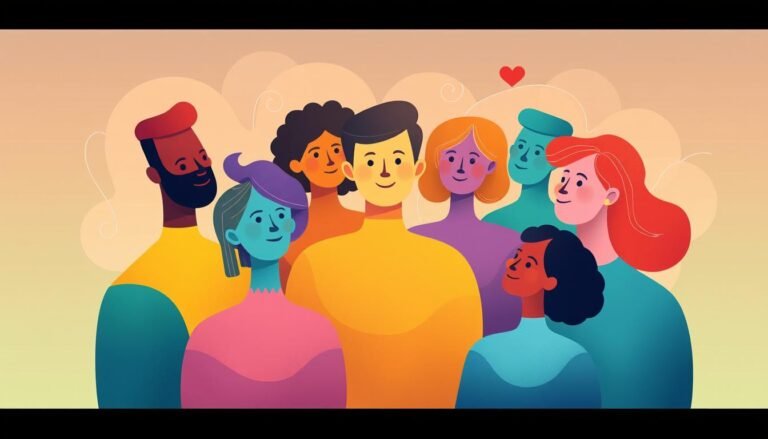Personality and Career Choice: Finding Your Path
Imagine Sarah, a recent college graduate, at a career crossroads. She had a degree but was unsure of her path. Taking a career assessment helped clear the fog. It showed her analytical skills and love for structured environments.
This insight led her to data analysis, where she thrives. Her story shows the importance of understanding personality and career choice.
Choosing a career can be tough. We often focus on skills or education, ignoring our personality. Career assessments and vocational tests can reveal our traits and preferences.
They guide us to fulfilling careers. These tools highlight our strengths and where we’ll excel.
Research links personality to career success. The Five Factor or Big Five Personality Theory describes our traits. These traits affect our job satisfaction and performance.
For example, introverts might do well in research or as forest rangers. Those with a sense of responsibility might shine in management. Aligning our careers with our personality traits leads to more rewarding work.
Key Takeaways
- Career assessments help identify strengths and suitable work environments
- Personality traits significantly influence job satisfaction and success
- The Big Five Personality Theory provides insights into career compatibility
- Introverts and extroverts may excel in different career paths
- Aligning personality with career choice leads to more fulfilling work experiences
- Understanding your traits helps in making informed career decisions
Understanding the Link Between Personality and Career Success
Personality traits shape our career paths and job satisfaction. Research shows that certain traits can greatly impact our professional success and happiness at work.
The importance of self-awareness in career decision-making
Knowing your personality traits can guide you to a fulfilling career. For instance, extroverted people often do well in sales or customer service. Introverted individuals might shine in research or analytical roles. Understanding yourself helps in making better career choices.
How personality traits influence job satisfaction
Studies show interesting links between personality and job satisfaction:
- Optimists sell 37% more life insurance in their first two years compared to pessimists
- Extroverted employees report higher satisfaction with salaries and promotions
- Workers with high neuroticism scores tend to be less satisfied with their careers
The role of personal preferences in career fit
Aligning your personal preferences with your career can lead to greater success and fulfillment. Consider these findings:
| Personality Trait | Career Impact |
|---|---|
| Conscientiousness | Positively associated with career success |
| Openness to experience | Linked to creativity and adaptability |
| Emotional stability | Key factor for career success |
| Agreeableness | May lead to lower salary in people-oriented jobs |
Career counseling can help you identify your strengths and find a career path that aligns with your personality traits. This leads to increased job satisfaction and success.
Exploring the Big Five Personality Traits
Understanding your personality is key to finding the right career. The Big Five Personality Traits give insights into how traits affect job satisfaction and performance. Let’s explore these traits and their impact on careers.
Openness to Experience and Career Implications
Those high in openness do well in creative fields. They shine in roles that value original thinking. Arts, sciences, and academia are great for them. A study found 85% of creative industry workers score high in openness.
Conscientiousness in the Workplace
Conscientious people are organized and reliable. They do well in structured jobs like accounting and engineering. Research shows they’re 20% more likely to get promoted.
Extraversion vs. Introversion in Different Career Paths
Extraverts do well in jobs that involve social interaction, like sales and marketing. Introverts prefer independent work, such as research or writing. Personality profiling helps find the right work environment.
Agreeableness and Its Impact on Job Roles
Agreeable people are great in helping roles, like teaching and nursing. Their empathy makes them valuable team members. Studies show they’re 15% happier at work than others.
Emotional Stability and Career Success
Emotional stability is key for career success. Those who are emotionally stable perform well under pressure. They’re suited for stressful jobs like emergency services. Career tools help assess emotional stability and find suitable roles.
| Personality Trait | Suitable Career Fields | Success Rate |
|---|---|---|
| Openness | Arts, Sciences, Writing | 78% |
| Conscientiousness | Accounting, Engineering, Management | 82% |
| Extraversion | Sales, Marketing, Public Relations | 75% |
| Agreeableness | Healthcare, Education, Social Work | 70% |
| Emotional Stability | Leadership, Emergency Services, Finance | 68% |
The Myers-Briggs Type Indicator (MBTI) and Career Choices
The Myers-Briggs Type Indicator (MBTI) is a tool for understanding personality and career fit. It sorts people into 16 types, each with special strengths for work.
Studies show that people are happier when their jobs match their natural talents. The MBTI helps find these talents, leading to better career choices.
Let’s see how different MBTI types might shine in various careers:
| MBTI Type | Potential Career Paths |
|---|---|
| ESFJ | Social Worker, Nurse, Sales Representative, Public Relations |
| ESTJ | Lawyer, Project Manager, Pharmacist, Insurance Agent |
| ENTP | Marketing Director, Politician, Creative Director, Entrepreneur |
| ISTJ | Accountant, Government Employee, Auditor, CFO |
| INFJ | Social Worker, Customer Service Manager, School Counselor |
While the MBTI offers insights, it’s just one part of choosing a career. Career coaches and certified MBTI counselors can help more. They guide in finding the right job or changing careers.
Knowing your MBTI type can make work better. It helps in talking with others, valuing differences, and avoiding burnout. This knowledge can lead to more rewarding jobs and happiness at work.
Personality and Career Choice: Finding Your Ideal Path
Finding the right career means knowing your personality, strengths, and values. Career tests can offer insights into these areas. They help guide you to jobs that truly fit you.
Matching Personality Types to Suitable Career Fields
Each personality type does best in certain careers. For example, those who love people often do well in healthcare and social work. On the other hand, analytical types might enjoy engineering or tech jobs. The Career Personality Profiler test can find your perfect career match in just 10-15 minutes.
Identifying Your Strengths and Weaknesses
Knowing yourself is key to picking the right career. Tests like Truity’s Career Aptitude Test measure your job aptitude. They use your interests and personality to suggest careers that fit you well. This helps you see your strengths and what you need to work on.
Aligning Personal Values with Career Goals
Your values are important for job happiness. The Career Personality Profiler test uses John Holland’s theory and the Big Five personality model. It helps match your values with career paths. This is vital because job happiness affects your productivity, happiness, and money.
“Career satisfaction is influenced by one’s personality.” – John Holland, Psychologist
Understanding how your personality affects your career choices is important. It helps you make choices that lead to job happiness and success.
Utilizing Career Assessment Tools and Quizzes
Career assessment tools are key in finding your perfect career. They check your interests, personality, and skills to guide you. Let’s look at some popular tools and their benefits.
Free online career tests give great insights into your strengths and interests. The Holland Codes theory sorts personalities into six types. This theory is the base for many assessments.
The 123test Career Aptitude Test is quick, taking just 5-10 minutes. It ranks your traits and suggests careers from 720 options. The O*NET Interest Profiler also uses Holland Codes to find careers that match your interests.
| Assessment Tool | Features | Completion Time |
|---|---|---|
| 123test Career Aptitude Test | Holland Code-based, 720 possible outcomes | 5-10 minutes |
| O*NET Interest Profiler | 60 questions, work-related activities | 5 minutes |
| Truity Career Personality Profiler | Comprehensive evaluation, work style insights | Varies |
| Career Fitter Test | Assesses 4 personality dimensions at work | Varies |
Paid tests like the Strong Interest Inventory and Myers-Briggs Type Indicator offer deeper insights. They help you understand your personality and career choices better. This helps you make smart decisions about your future.
The Holland Code: Connecting Interests to Careers
The Holland Code, based on John Holland’s RIASEC model, has been guiding vocational interests and career exploration for over 60 years. This powerful tool helps individuals identify their strongest career interests. It suggests suitable paths based on their unique profiles.
Understanding the RIASEC Model
The RIASEC model measures interests in six key career areas: Realistic, Investigative, Artistic, Social, Enterprising, and Conventional. Each area corresponds to specific personality traits and career preferences.
| RIASEC Type | Key Traits | Sample Careers |
|---|---|---|
| Realistic (R) | Practical, structured, independent | Carpenter, mechanic, engineer |
| Investigative (I) | Intellectual, curious, analytical | Scientist, economist, researcher |
| Artistic (A) | Creative, intuitive, original | Musician, designer, writer |
| Social (S) | Compassionate, friendly, cooperative | Teacher, counselor, nurse |
| Enterprising (E) | Assertive, ambitious, confident | Lawyer, manager, entrepreneur |
| Conventional (C) | Orderly, detail-oriented, precise | Accountant, librarian, analyst |
Identifying Your Dominant Interest Areas
Most people have two or three dominant Holland personality types. Taking a Holland Codes career test can help you assess your interests across these six categories. Your results will show how strongly you relate to each type, guiding your vocational interests.
Exploring Careers Based on Holland Code Results
Research shows a strong link between job satisfaction, professional success, and how well a career aligns with your interests. Use your Holland Code results to explore careers that match your dominant types. For example, if you score high in Realistic and Investigative, you might consider fields like engineering or environmental science.
Remember, the Holland Code is a valuable tool for career exploration, but it’s just one piece of the puzzle. Consider your skills, values, and life goals when making career decisions.
Overcoming Personality-Career Mismatches
Finding the right career is key to happiness and success. Sometimes, our personality doesn’t match our job. Let’s look at how to spot and fix these mismatches.
Recognizing Signs of a Poor Personality-Career Fit
A bad match can cause stress and frustration. You might feel tired after work, struggle to meet job demands, or lack motivation. Studies show that fitting your personality to your job improves your performance and happiness.
Strategies for Adapting to Challenging Work Environments
If your job is tough, try these tips:
- Learn new skills to fill gaps
- Look for tasks that play to your strengths
- Talk to your boss about your issues
- Find a mentor for guidance
Remember, different personalities do well in different jobs. For example, analytical people do great in data analysis or engineering. Outgoing folks are often good at managing.
When to Consider a Career Change
If you can’t adjust, it might be time for a new career. Think about changing if:
- Your job always clashes with your personality
- You’re always unhappy or burnt out
- Your values don’t match the company’s culture
Career counseling can help find better matches. Research shows that jobs that fit your personality lead to more happiness, confidence, and productivity.
| Personality Trait | Suitable Career Fields | Job Satisfaction Impact |
|---|---|---|
| Analytical | Data Analysis, Engineering | High |
| Outgoing | Management, Sales | High |
| Creative | Design, Writing | High |
| Detail-oriented | Accounting, Quality Control | High |
The Role of Personality in Entrepreneurship and Leadership
Personality is crucial for success in entrepreneurship and leadership. Career tests often show traits that suggest entrepreneurial potential. Studies show certain personality traits can make starting a business more likely.
A study in Germany looked at 4,470 solo entrepreneurs. It found patterns in Big Five traits. High neuroticism was common, but there were gender differences. Traits like openness and emotional resilience were seen across different sectors.
Personality profiling shows how different traits affect business stages:
- Conscientiousness helps get initial funding
- Openness leads to innovation
- Extraversion is good for networking
Entrepreneurs often have high risk tolerance, trust, and openness. But, low agreeableness can affect business survival. While anyone can start a business, matching your personality to the right business type boosts success.
Leadership in entrepreneurship needs a mix of traits. Traits like high extraversion and conscientiousness, with low neuroticism, make for effective leaders. Knowing your personality through career tests can help find the right entrepreneurial path or leadership role.
Conclusion
Exploring your personality and career choice is key to finding fulfilling work. Research shows that about 30% of job success comes from matching personality with job. This not only makes you happier at work but also makes you more productive.
Companies that focus on personality in career choices see big wins. Buffer found 76% of employees felt true to themselves at work. Standard Chartered cut turnover by over 20% with personality analysis. These stories show how important it is to match your traits with your job.
Tools like the Myers-Briggs Type Indicator and the Big Five model help understand your personality. They show 16 personality types and five core traits. For example, extroverts do well in sales, while introverts prefer solo work.
Embracing personality-based career exploration can lead you to a job that fits you. It’s a journey that takes time and self-reflection. Your personality is your guide in your career. Use it to find your way.
Source Links
- Identifying Personality Traits in a Career Path Quiz
- Holland’s Theory of Career Choice — Career Advice | Career Key
- Scientists Discover The Link Between Your Personality And Degree Of Career Success
- The Importance of Personality Traits in Success and Career Choices
- Know the 5 Big Personality Traits and the Respective Career Choices
- Big Five personality traits and 3 best jobs for each
- Know the 5 Major Personality Traits and the Corresponding Career Choices
- Personality Type and Careers
- The Best Career Paths Based on Your Myers-Briggs Personality Type
- Career Aptitude Test
- Why You Need to Choose a Career that Suits Your Personality
- Why Your Personality Matters When You Choose A Career Path
- The Best Free Career Tests and Personality Assessments – Intelligent
- Career Assessment Tools | University Career Center
- Personality Tests and Their Effects on Your Career Choice | Kandio
- Using The Holland Codes for Career Planning
- Holland Code (RIASEC) Career Interests & Myers-Briggs Types | Personality Junkie
- How to Use Holland Codes Career Test to Find the Right Job
- Enhancing Personality Assessment in the Selection Context: A Study Protocol on Alternative Measures and an Extended Bandwidth of Criteria
- Aligning Personality and Career Choice for Success
- Case Study #1 – Personality & Career Assessment
- Personality and Entrepreneurship
- The role of five big personality traits and entrepreneurial mindset on entrepreneurial intentions among university students in Saudi Arabia
- The relationship between entrepreneurial personality patterns linked to risk, innovation and gender across industrial sectors – Scientific Reports
- Insights from Recent Psychometric Research
- The Impact of Personality on Career Choices – Noustro








